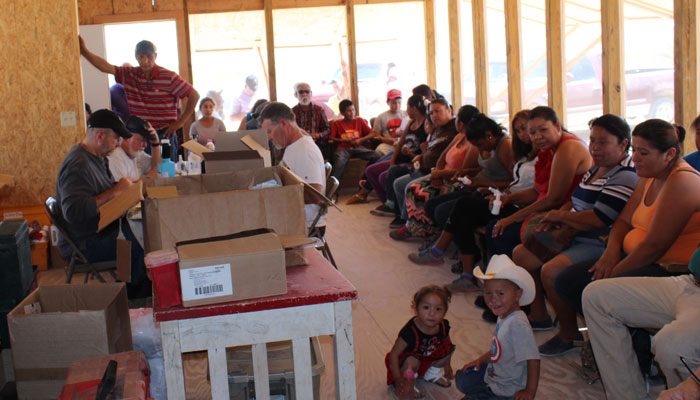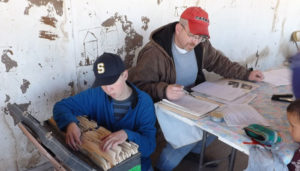Good people doing the right thing

As the sun rises over Eagle Pass, just across the U.S. border into Mexico, a small caravan of trucks and cargo trailers slowly makes its way toward the State of Coahuila in the country’s northwestern region.
The travelers are doctors, nurses and other volunteers who for more than 30 years have been the main source of medical care for isolated desert villages that would otherwise go without.
For the last 10 years, Dr. Thad Miller and his family have been a part of this group. A UNT Health Science Center public health professor, Dr. Miller recently spent his spring break on one of the trips, visiting three villages.
“The closest town is six hours away from some of these remote communities, across rugged desert terrain. There is scant infrastructure and few resources,” he said. “These families have so little—no electricity, running water, stores or routine communication with the outside. And without us, they would have no medical care.”
Volunteers help however they can, and the situations vary. This trip, Dr. Miller managed the visiting clinic’s pharmacy, dispensing patient medications. He leads trips, and even helped a community build a water well during one visit. Along the way, he has also worked on vehicle repairs and changed a few flat tires as needed.
“It’s challenging under the best circumstances, and a lot can go wrong. But experience is a great teacher,” Dr. Miller said.
“The roads are so bad into these remote areas that we always risk car trouble. One year, a trailer simply broke apart hours from the nearest town,” he said.
Dr. Miller speaks enough conversational Spanish to get by, and over the years, he and his family have forged friendships that go beyond words. His wife is a pediatrician, his sister is a registered dietitian, and his brother-in-law is a firefighter and paramedic. All of their children have come along on trips, as well as Dr. Miller’s 74-year-old mother.

“Our kids have grown up being a part of the medical mission trips, since my oldest daughter, who is now entering college, was about 8 years old,” he said. “Our children used to play with the local kids while their parents were at the clinic, and now, each time we return, it’s like a family reunion.”
Dr. Miller serves on the Board of Mision de Candelilla, the Fredericksburg, Texas, non-profit organization that has coordinated the trips since 1986.
When first he joined as a volunteer, Dr. Miller was looking for a meaningful way to help people and to give his children an understanding of the world and the values of service.
“I had been on medical mission trips to other countries before where the health problems were more than visiting volunteers could take on,” he said. “Good health care in a resource-poor region requires consistency, relationships and continuity. It takes years, and single visits by well-meaning medical teams really can’t do much.”
“The ongoing relationships we have built with these little villages in Mexico are enabling us to address health issues typical of those in any primary practice – diabetes, high blood pressure, the need for antibiotics and conditions that can be helped by a wellness visit or minor surgical procedure, “ he said.
Mision de Candelilla cares for 12 Mexican villages overall, visiting each community on its “route” at regular six-month intervals. By providing a 180-day supply of necessary routine medications, the organization is able to effectively manage a great majority of the medical needs.
Dr. Miller estimates that Mision de Candelilla provides more than 2,000 patient encounters and distributes medication with a retail prescription value of more than $1 million each year, all of which comes through donations, fundraising and volunteer efforts, never at a cost to the people it serves.
Mision de Candelilla takes its name from the candelilla desert plant that grows in Mexico, which is harvested for wax used in candles, cosmetics and other beauty products. The name is symbolic of bringing light to others in a region where the stark challenges of daily living mirror the long, labor-intensive process villagers use to extract and prepare the wax for sale.
“Being a part of something like this really helps you get your perspective,” Dr. Miller said. “You put your own needs on the shelf and spend the week serving others first. We gain as much from the friendships and experience as the people we care for.”
“While we can’t fix every problem, we help where we can. It’s just good folks doing the things that need to be done.”






Social media